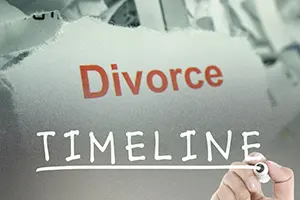Colorado Divorce Timeline – How Fast Can a Divorce Be Finalized In Colorado?
 In Colorado, the shortest possible divorce takes 91 days, though most cases take longer.
In Colorado, the shortest possible divorce takes 91 days, though most cases take longer.
Some couples can finalize their divorce in just a few months, while others endure the proceedings for years.
The length of the process depends largely on how cooperative each spouse is, and how soon they agree on divorce matters like property division, child custody, and child support. In any case, however, in order to receive a divorce decree within 91 days of filing jointly, or within 91 days of serving the opposing party with the Petition for Dissolution of Marriage and the Summons, both parties must agree on all aspects of the divorce.
Here is a basic timeline for a Colorado divorce.
1) Residency Requirement
Before anything else, either spouse must have resided in Colorado for at least 91 days before they can file for divorce.
2) Initial Filing and Service
Either spouse (or their lawyer) may initiate the process by filing a Petition for Dissolution of Marriage with the court. The petitioner must serve the initial papers to the other spouse. This receiving spouse (the respondent) will then have 21 days to file their official response if they live in Colorado, or 35 days if they live out of state.
If both spouses are filing jointly, they may skip the serving of papers and the filing of a response. Filing a joint petition means they have both agreed on all matters of divorce and just need to submit an Affidavit for Decree for the judge to approve.
Colorado has a mandatory waiting period of 91 days for a divorce to be finalized. This means that the earliest they can complete your divorce is 91 days after filing, even if there are no contested issues.
3) Financial Disclosure
Both spouses are required to submit to the court their mandatory financial disclosure documents 42 days after the service of the Petition for Dissolution of Marriage and the Summons.
4) Court Schedules, ISC
After the initial divorce filing, the court will schedule court dates and other filing deadlines. Among these dates will be the Initial Status Conference (ISC), which is a mandatory first meeting between parties alongside the judge or a Family Court Facilitator. The ISC is typically scheduled within 42 days of the initial filing.
5) Temporary Orders
If either party has an immediate concern that needs court intervention — for example, on child support or spousal support — they may ask the court to hold a Temporary Order Hearing. Any Temporary Order that comes from this hearing is only meant to last for a short time, typically until final divorce orders are decreed.
6) Mediation or Divorce Trial
Courts commonly require couples parties to go through divorce mediation to resolve disputes and arrive at a settlement without going through a divorce trial (litigation).
A litigated divorce is substantially lengthier, usually stretching more than a year. By contrast, a successfully mediated divorce can settle with just one or a couple mediation sessions. The parties will only need to craft their settlement agreement for the court to approve.
If the spouses cannot resolve their disputes even with mediation, the divorce will go to trial. The court will schedule hearings where each party argues their side using evidence and witnesses.
The judge or magistrate will then rule on contested issues.
7) Final Hearing
Depending on the circumstances of your case, a Permanent Orders Hearing may be necessary.
Two of the biggest factors that affect the speed of divorce are the complexity of contested matters and the amicability of each spouse. Some couples have to iron out complicated legal issues like dividing assets and debts before they can proceed with the divorce case. Others may experience delays due to antagonistic or uncooperative attitudes.
Each divorce case is different. If you wish for a smooth divorce process without compromising your rights, you’ll want sound legal advice from an experienced divorce attorney.
Call a Trusted Divorce Lawyer in Colorado
The divorce attorneys at Goldman Law are highly trusted and well-versed in all aspects of Colorado Family Law. They’re here to support you and ensure that your family is protected through this difficult time.
Call (303) 656-9529 or contact us online for a consultation.

